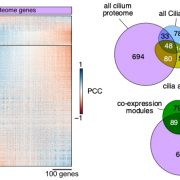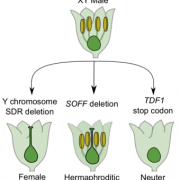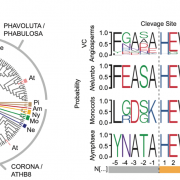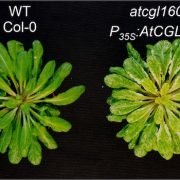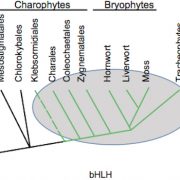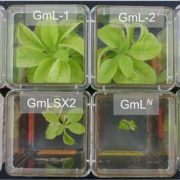The amount of nitrogen used for photosynthesis modulates molecular evolution in plants (Mol Biol Evol)
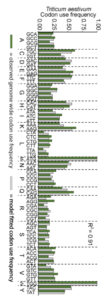 Plant growth is often limited by the availability of nitrogen (N), which is required to synthesise monomers and macromolecules, and is especially important in the synthesis of the carbon assimilating enzymes of the Calvin-Benson-Bassham (CBB) cycle. In this article, Kelly has demonstrated that photosynthetic efficiency is reflected in both genome and transcript nucleotide composition, due to the varying requirement for N in order to synthesise the four nucleotide monomers. For example, species that are less photosynthetically efficient require vast amounts of N-rich Rubisco, and hence they favour the use of synonymous codons that require less N. This strong selection pressure to use less N in transcripts confers a slow rate of evolution on such transcripts, and is especially true for highly abundant transcripts. Up to 10% of the variation in evolutionary rate at synonymous sites could be explained by this phenomenon. Furthermore, when examining basic amino acid residues, the author demonstrated that such species also conserve N by using amino acids with less N in their side chains to synthesise proteins. This study raises the intriguing prospect of increased plant diversification in a future high-CO2 environment: elevated CO2 leads to enhanced nitrogen use efficiency, which would reduce the selection pressure to minimise the N content of transcripts. (Summary by Mike Page) Mol Biol Evol 10.1093/molbev/msy043
Plant growth is often limited by the availability of nitrogen (N), which is required to synthesise monomers and macromolecules, and is especially important in the synthesis of the carbon assimilating enzymes of the Calvin-Benson-Bassham (CBB) cycle. In this article, Kelly has demonstrated that photosynthetic efficiency is reflected in both genome and transcript nucleotide composition, due to the varying requirement for N in order to synthesise the four nucleotide monomers. For example, species that are less photosynthetically efficient require vast amounts of N-rich Rubisco, and hence they favour the use of synonymous codons that require less N. This strong selection pressure to use less N in transcripts confers a slow rate of evolution on such transcripts, and is especially true for highly abundant transcripts. Up to 10% of the variation in evolutionary rate at synonymous sites could be explained by this phenomenon. Furthermore, when examining basic amino acid residues, the author demonstrated that such species also conserve N by using amino acids with less N in their side chains to synthesise proteins. This study raises the intriguing prospect of increased plant diversification in a future high-CO2 environment: elevated CO2 leads to enhanced nitrogen use efficiency, which would reduce the selection pressure to minimise the N content of transcripts. (Summary by Mike Page) Mol Biol Evol 10.1093/molbev/msy043


